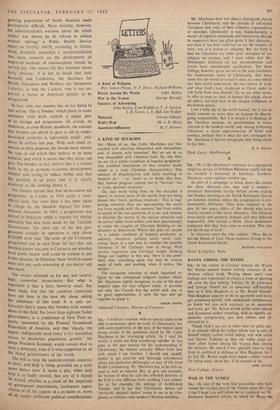Sta,—I write as a layman, with no special claim to
be able to pronounce upon the truth of Christianity, but with some experience, in the past, of the impact upon young people of the questions raised by Mr. Colin Maclnnes in his interesting article. As I read his article, I could not help wondering whether he has gone to the best sources for his understanding of Christianity; his version certainly differs from that with which I am familiar. I should not, myself, expect to get accurate and thorough information about any particular philosophy or way of life from Radio Luxembourg. Mr. Maclnnes has, as he tells us, read as well as listened. But, to give one example, his version of what he calls the orthodox doctrine of the Fall is very different from anything I can remem- ber in, for example, the writings of Archbishop Temple; and to say that Christianity denies our 'inevitable physical nature' seems to me to be com- pletely at variance with modern Christian teaching. Mr. Maclnnes does not always distinguish clearly between Christianity and the attitude of self-styled Christians and, even, of their collective organisations or churches. Christianity is not, fundamentally, a matter of negative commands and restrictions, though its supporters have too pften given it that character; nor does it 'use fear—and fear to use the weapon of love'; nor is it joyless or unhappy. But the truth is that we Christians are often poor examples of the religion we profess, and I must admit that Mr. MacInnes's strictures on our inconsistencies and errors have considerable justification. Yet these failings, however gross, do not in the least invalidate the fundamental claim of Christianity, that Jesus came into the world to reveal to man, in a way which any man could understand, the true nature of God, and what God's love, displayed in Christ, seeks to call forth from man himself. Or, to use other terms, to offer to man an ideal of human life which, above all others, can lead man to the deepest fulfilment of his human nature.
I am a little shy of the word 'revival,' for it can so easily connote no more than an increase in church- going respectability. But if it means a re-thinking of the Christian message, its proclamation in terms relevant to the modern world, and, among professing Christians, a closer approximation of belief and conduct, perhaps that is what the seer, envisaged by Mr. Maclnnes in his last paragraph, may bring about in due time.


































 Previous page
Previous page